Leadership & Management Approaches in Health & Social Care Org
VerifiedAdded on 2024/05/20
|15
|949
|208
Presentation
AI Summary
This presentation explores leadership theories and management approaches relevant to health and social care (HSC) organizations. It discusses transformational and transactional leadership, John Adair's action-centered leadership, and Goleman's styles of emotional intelligence. The presentation also covers managing working relationships through regulations, team building, and task allocation, highlighting contingency approaches to leadership. It differentiates between management and leadership, emphasizing the impact of management approaches on personal development within HSC. The conclusion reflects on the importance of effective team building and management in motivating employees and fostering personal and professional growth.
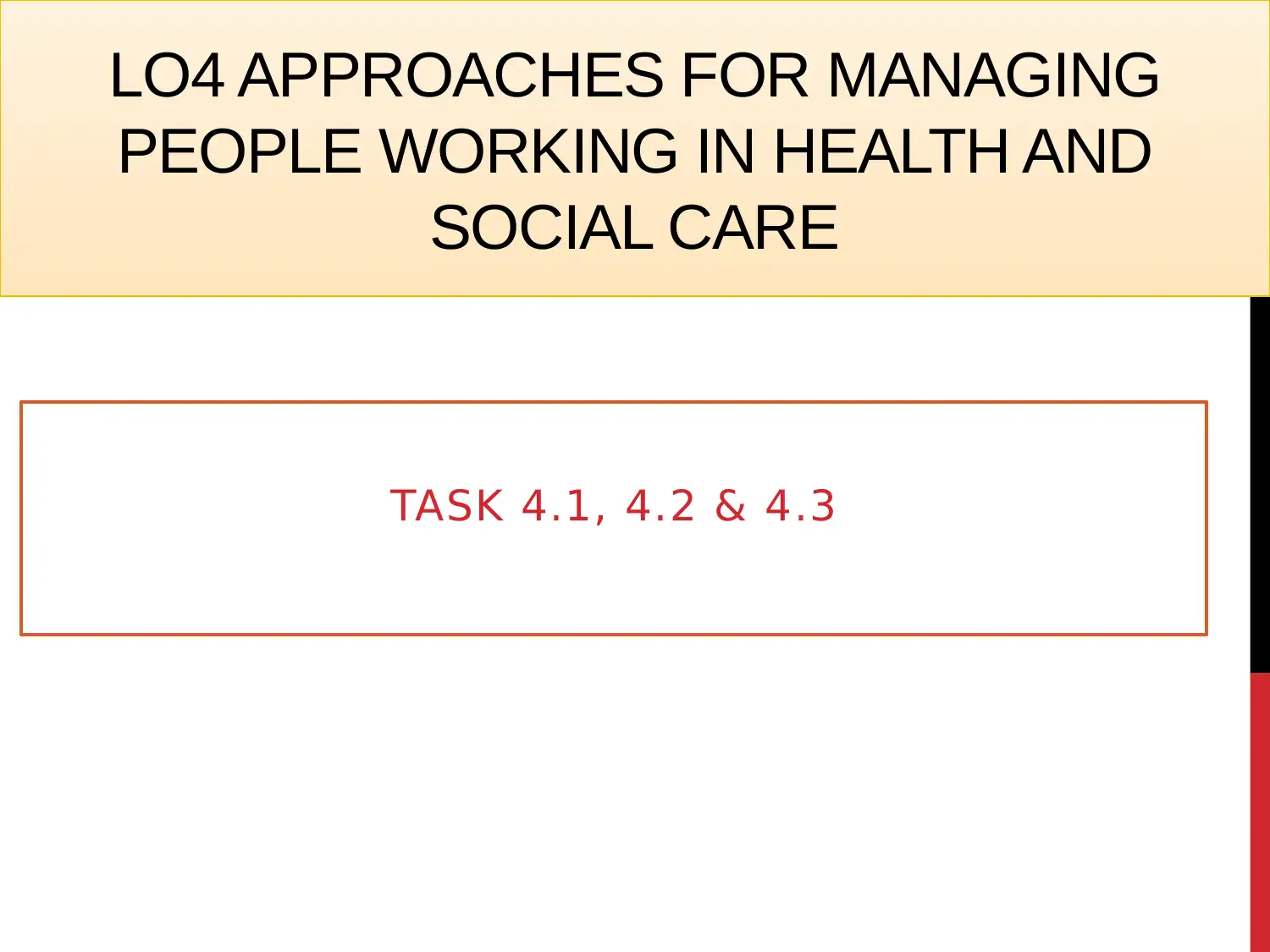
LO4 APPROACHES FOR MANAGING
PEOPLE WORKING IN HEALTH AND
SOCIAL CARE
TASK 4.1, 4.2 & 4.3
PEOPLE WORKING IN HEALTH AND
SOCIAL CARE
TASK 4.1, 4.2 & 4.3
Paraphrase This Document
Need a fresh take? Get an instant paraphrase of this document with our AI Paraphraser
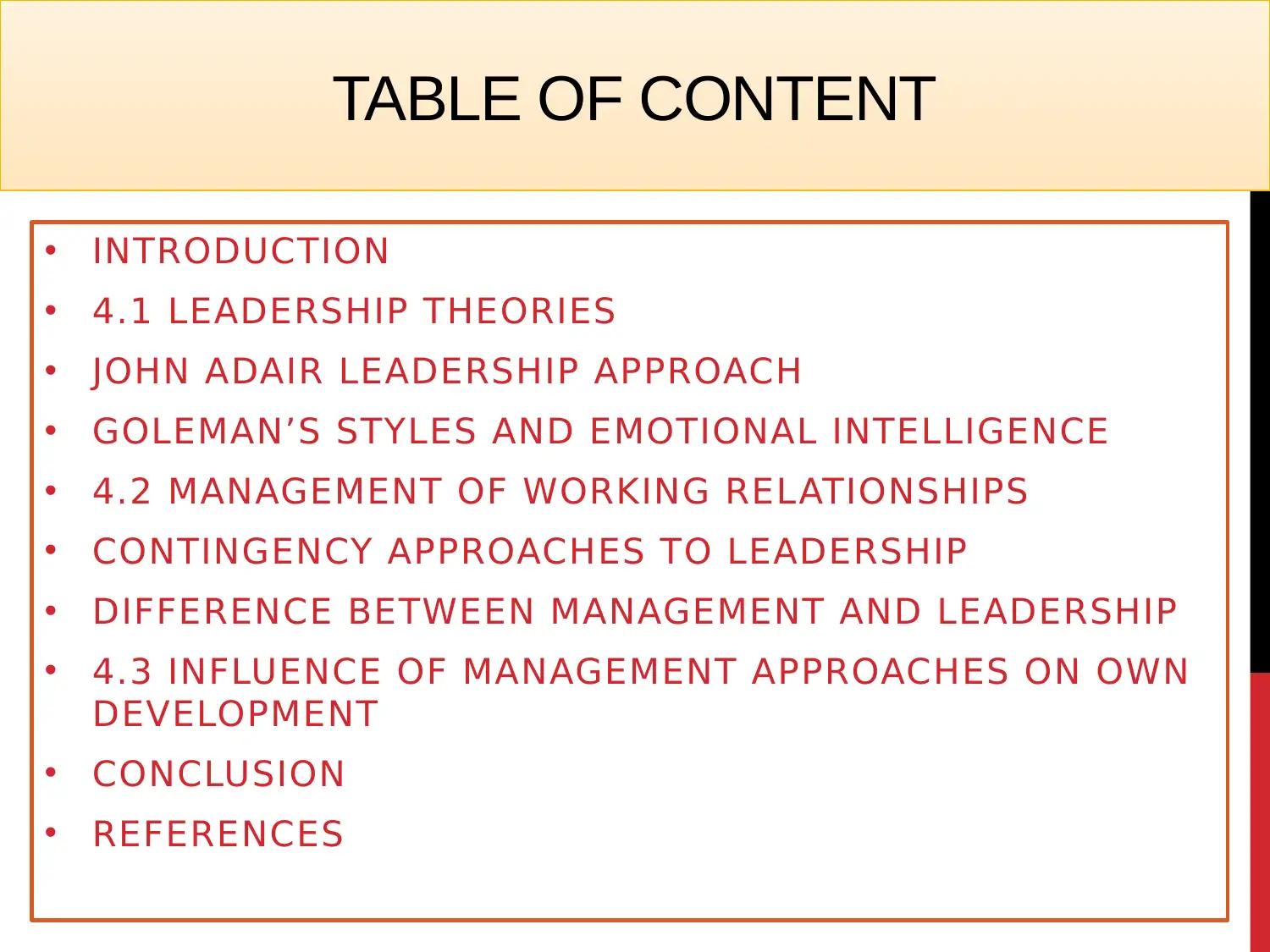
TABLE OF CONTENT
• INTRODUCTION
• 4.1 LEADERSHIP THEORIES
• JOHN ADAIR LEADERSHIP APPROACH
• GOLEMAN’S STYLES AND EMOTIONAL INTELLIGENCE
• 4.2 MANAGEMENT OF WORKING RELATIONSHIPS
• CONTINGENCY APPROACHES TO LEADERSHIP
• DIFFERENCE BETWEEN MANAGEMENT AND LEADERSHIP
• 4.3 INFLUENCE OF MANAGEMENT APPROACHES ON OWN
DEVELOPMENT
• CONCLUSION
• REFERENCES
• INTRODUCTION
• 4.1 LEADERSHIP THEORIES
• JOHN ADAIR LEADERSHIP APPROACH
• GOLEMAN’S STYLES AND EMOTIONAL INTELLIGENCE
• 4.2 MANAGEMENT OF WORKING RELATIONSHIPS
• CONTINGENCY APPROACHES TO LEADERSHIP
• DIFFERENCE BETWEEN MANAGEMENT AND LEADERSHIP
• 4.3 INFLUENCE OF MANAGEMENT APPROACHES ON OWN
DEVELOPMENT
• CONCLUSION
• REFERENCES
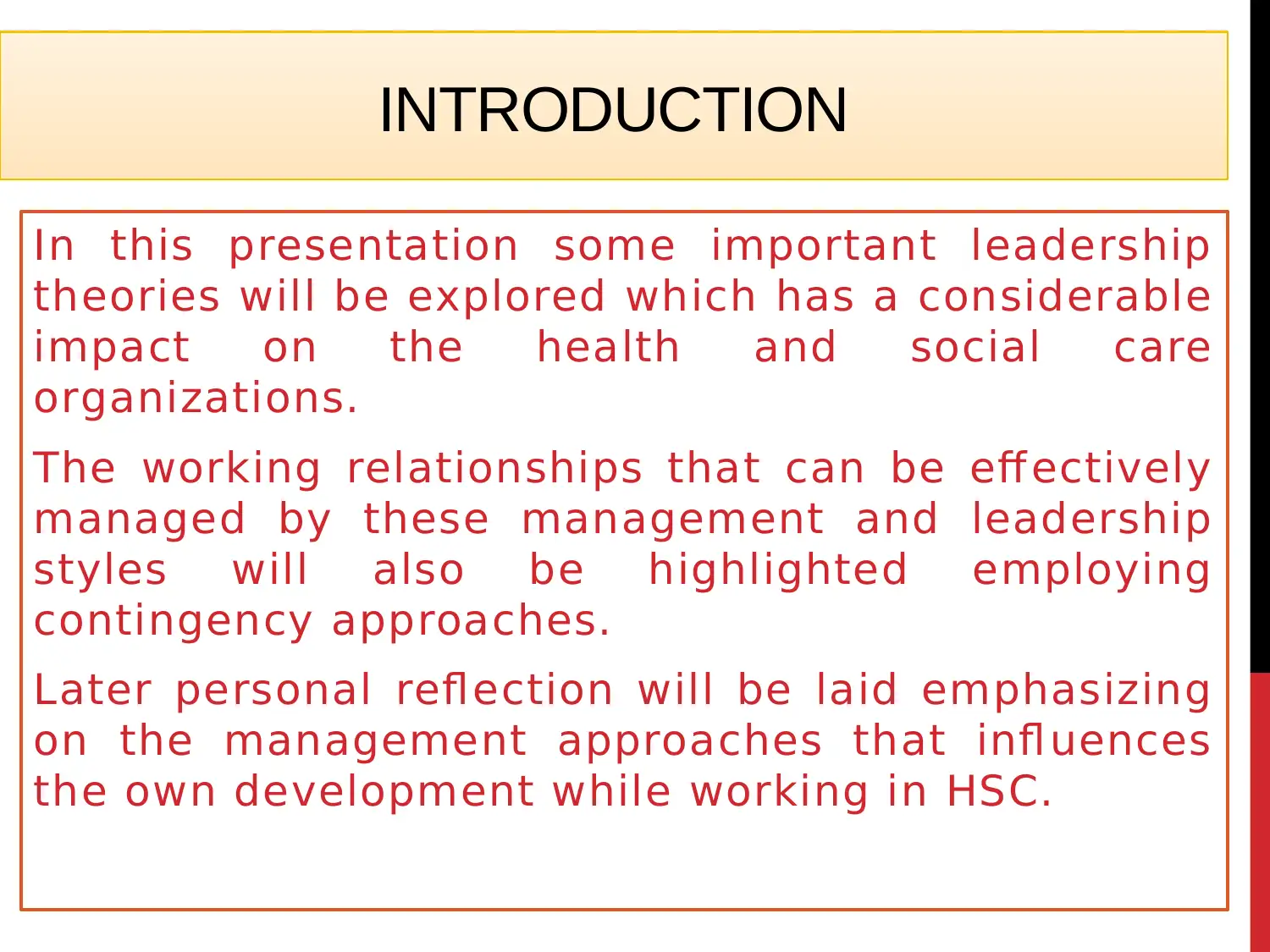
INTRODUCTION
In this presentation some important leadership
theories will be explored which has a considerable
impact on the health and social care
organizations.
The working relationships that can be effectively
managed by these management and leadership
styles will also be highlighted employing
contingency approaches.
Later personal reflection will be laid emphasizing
on the management approaches that infl uences
the own development while working in HSC.
In this presentation some important leadership
theories will be explored which has a considerable
impact on the health and social care
organizations.
The working relationships that can be effectively
managed by these management and leadership
styles will also be highlighted employing
contingency approaches.
Later personal reflection will be laid emphasizing
on the management approaches that infl uences
the own development while working in HSC.
⊘ This is a preview!⊘
Do you want full access?
Subscribe today to unlock all pages.

Trusted by 1+ million students worldwide
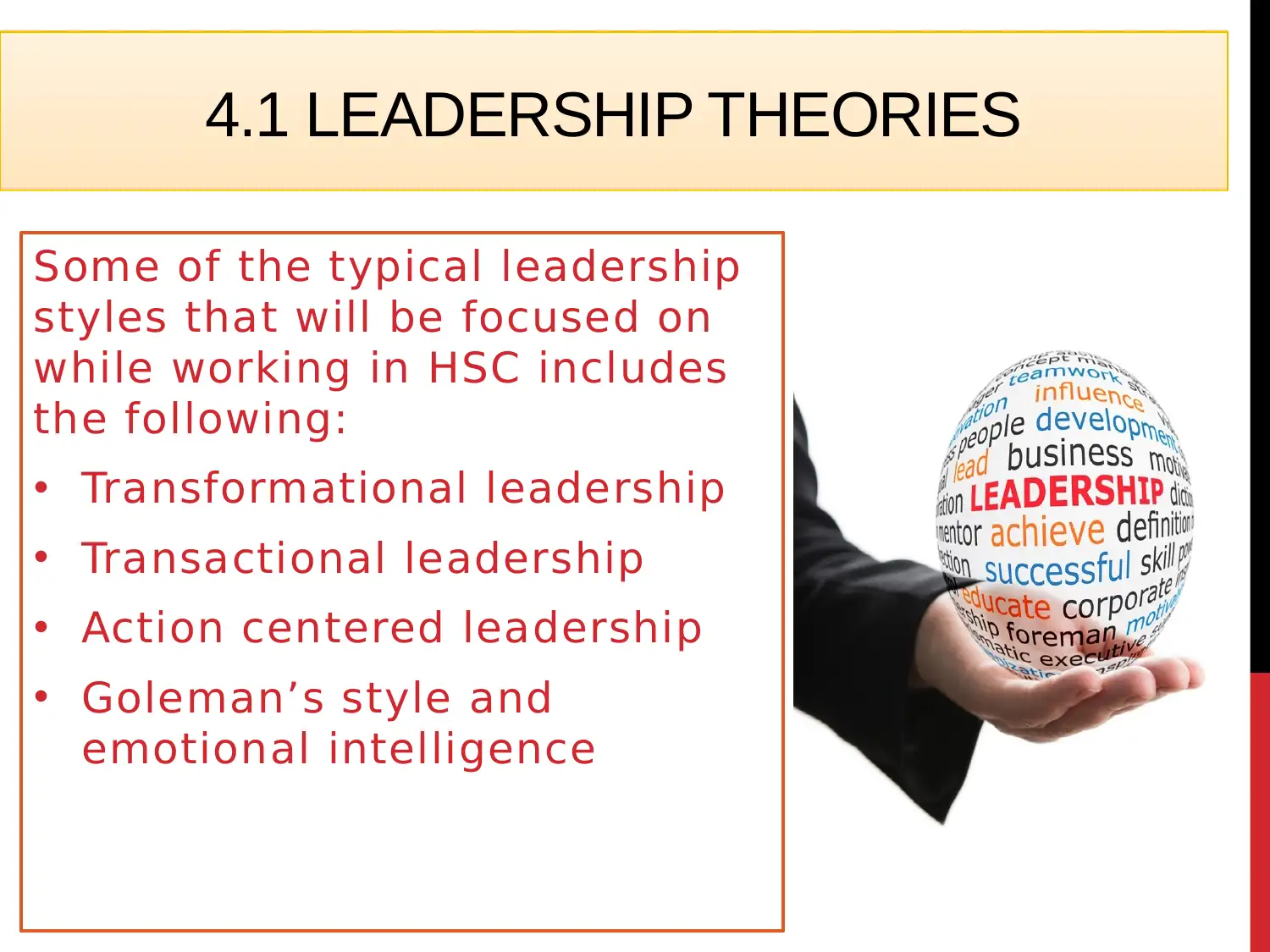
4.1 LEADERSHIP THEORIES
Some of the typical leadership
styles that will be focused on
while working in HSC includes
the following:
• Transformational leadership
• Transactional leadership
• Action centered leadership
• Goleman’s style and
emotional intelligence
Some of the typical leadership
styles that will be focused on
while working in HSC includes
the following:
• Transformational leadership
• Transactional leadership
• Action centered leadership
• Goleman’s style and
emotional intelligence
Paraphrase This Document
Need a fresh take? Get an instant paraphrase of this document with our AI Paraphraser
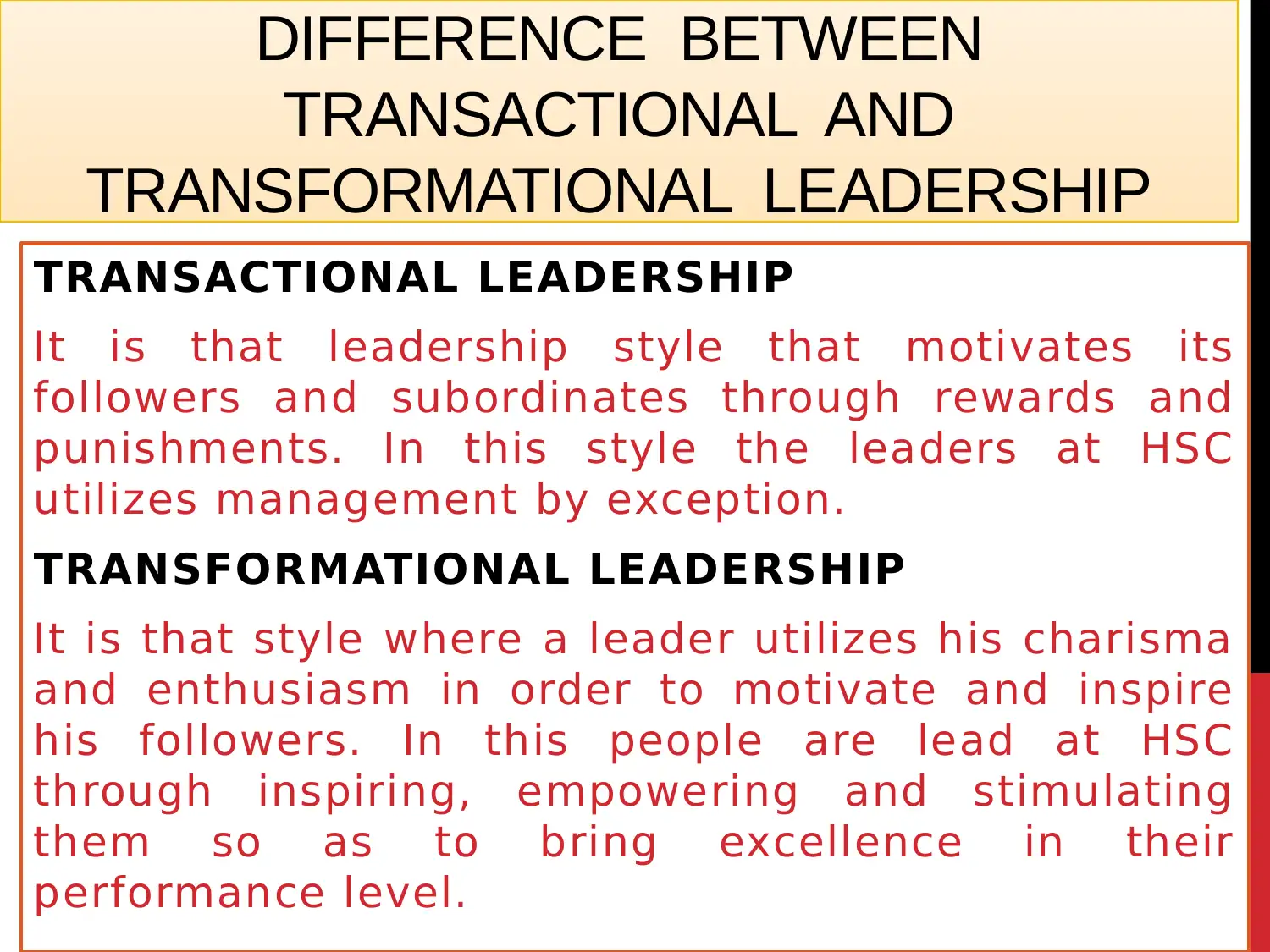
DIFFERENCE BETWEEN
TRANSACTIONAL AND
TRANSFORMATIONAL LEADERSHIP
TRANSACTIONAL LEADERSHIP
It is that leadership style that motivates its
followers and subordinates through rewards and
punishments. In this style the leaders at HSC
utilizes management by exception.
TRANSFORMATIONAL LEADERSHIP
It is that style where a leader utilizes his charisma
and enthusiasm in order to motivate and inspire
his followers. In this people are lead at HSC
through inspiring, empowering and stimulating
them so as to bring excellence in their
performance level.
TRANSACTIONAL AND
TRANSFORMATIONAL LEADERSHIP
TRANSACTIONAL LEADERSHIP
It is that leadership style that motivates its
followers and subordinates through rewards and
punishments. In this style the leaders at HSC
utilizes management by exception.
TRANSFORMATIONAL LEADERSHIP
It is that style where a leader utilizes his charisma
and enthusiasm in order to motivate and inspire
his followers. In this people are lead at HSC
through inspiring, empowering and stimulating
them so as to bring excellence in their
performance level.
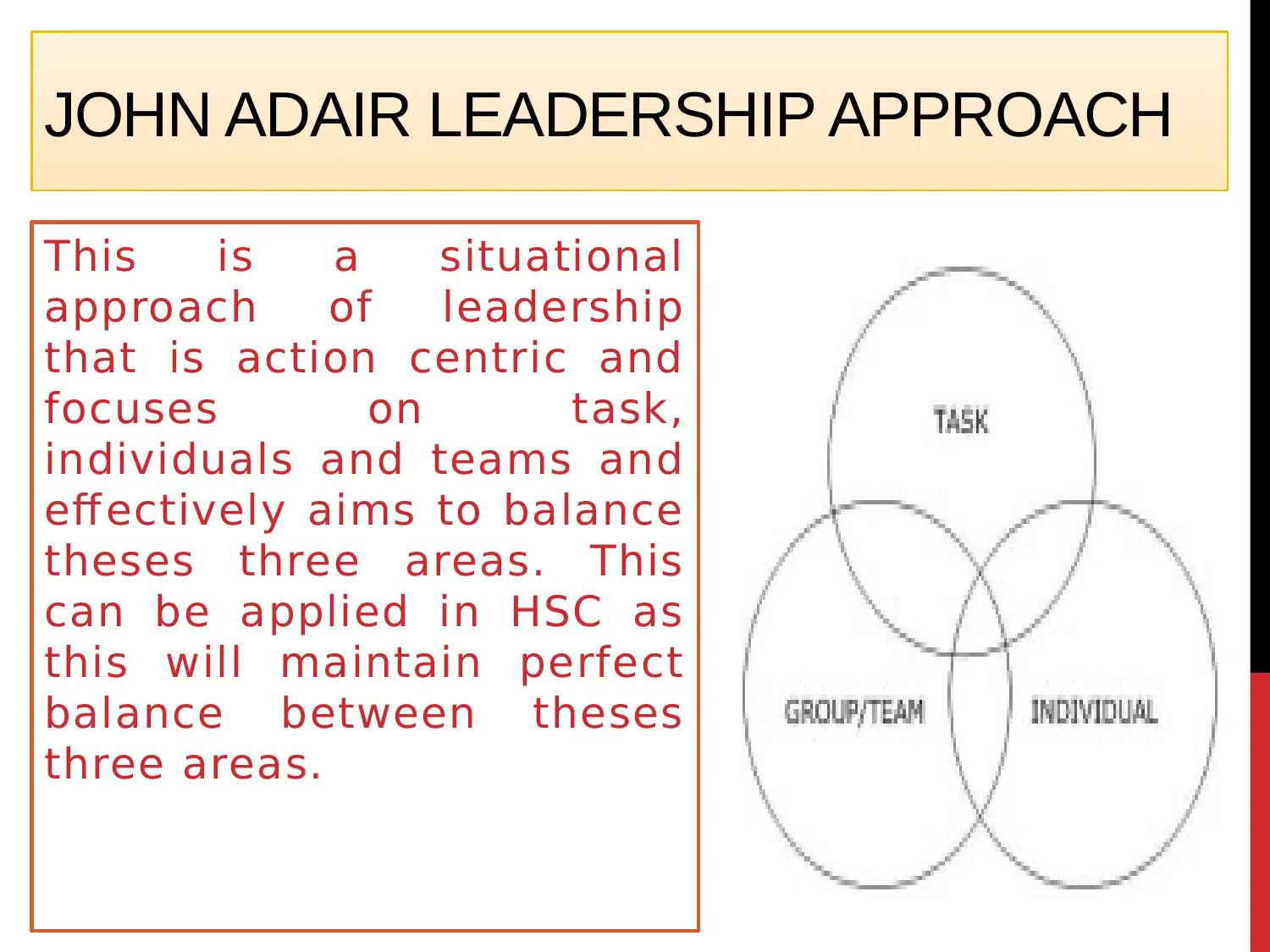
JOHN ADAIR LEADERSHIP APPROACH
This is a situational
approach of leadership
that is action centric and
focuses on task,
individuals and teams and
eff ectively aims to balance
theses three areas. This
can be applied in HSC as
this will maintain perfect
balance between theses
three areas.
This is a situational
approach of leadership
that is action centric and
focuses on task,
individuals and teams and
eff ectively aims to balance
theses three areas. This
can be applied in HSC as
this will maintain perfect
balance between theses
three areas.
⊘ This is a preview!⊘
Do you want full access?
Subscribe today to unlock all pages.

Trusted by 1+ million students worldwide
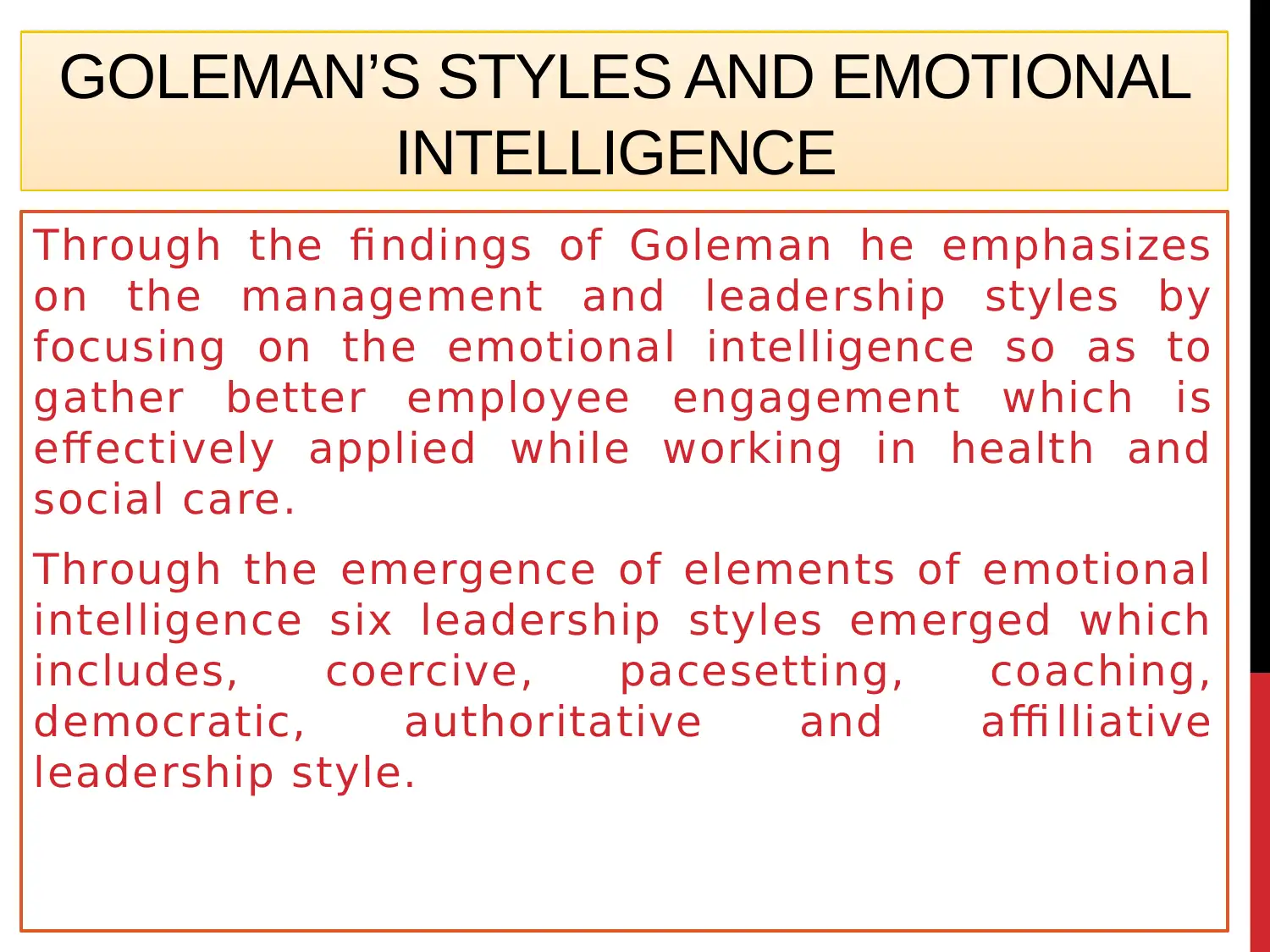
GOLEMAN’S STYLES AND EMOTIONAL
INTELLIGENCE
Through the findings of Goleman he emphasizes
on the management and leadership styles by
focusing on the emotional intelligence so as to
gather better employee engagement which is
eff ectively applied while working in health and
social care.
Through the emergence of elements of emotional
intelligence six leadership styles emerged which
includes, coercive, pacesetting, coaching,
democratic, authoritative and affi lliative
leadership style.
INTELLIGENCE
Through the findings of Goleman he emphasizes
on the management and leadership styles by
focusing on the emotional intelligence so as to
gather better employee engagement which is
eff ectively applied while working in health and
social care.
Through the emergence of elements of emotional
intelligence six leadership styles emerged which
includes, coercive, pacesetting, coaching,
democratic, authoritative and affi lliative
leadership style.
Paraphrase This Document
Need a fresh take? Get an instant paraphrase of this document with our AI Paraphraser
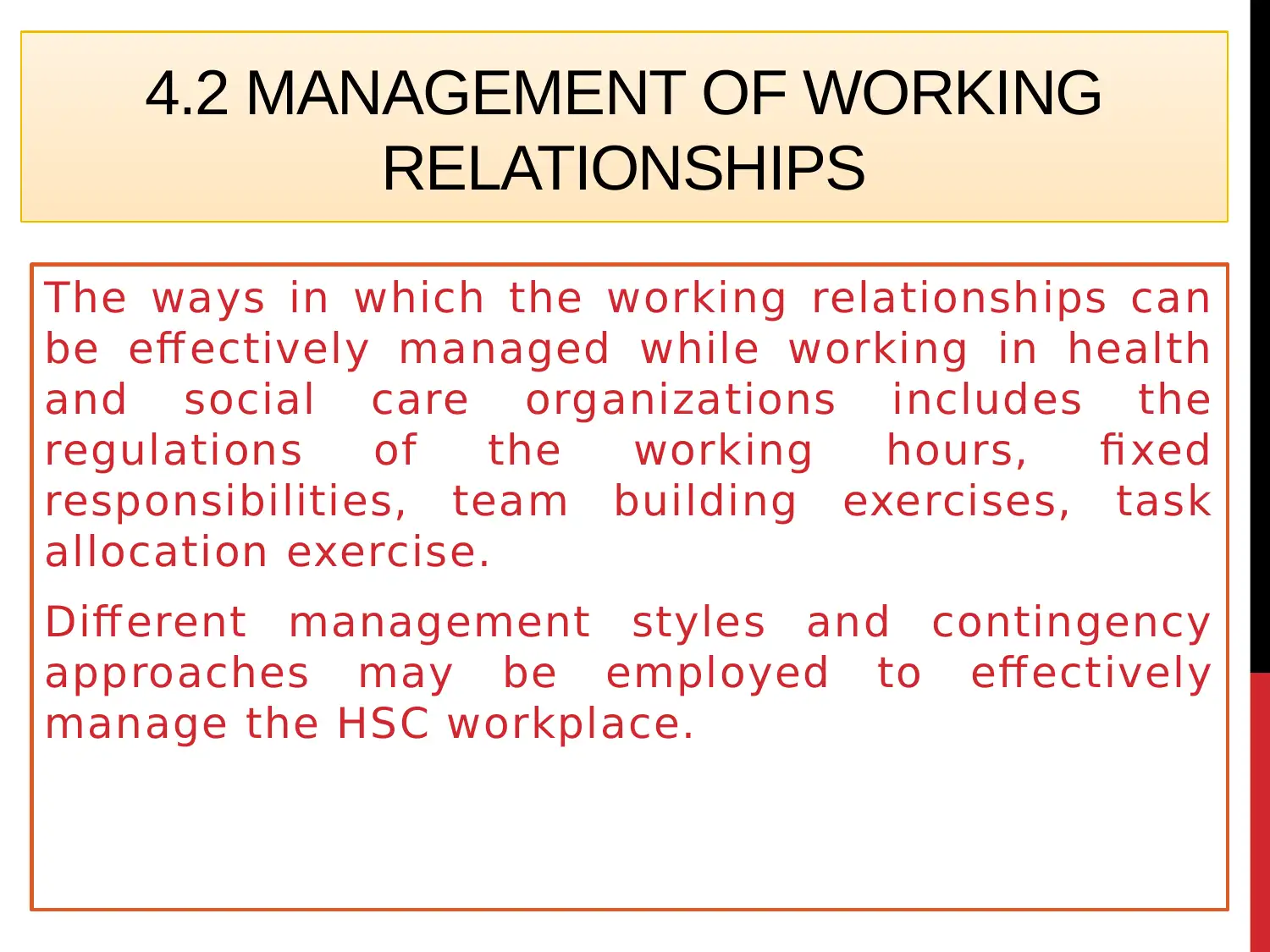
4.2 MANAGEMENT OF WORKING
RELATIONSHIPS
The ways in which the working relationships can
be effectively managed while working in health
and social care organizations includes the
regulations of the working hours, fixed
responsibilities, team building exercises, task
allocation exercise.
Different management styles and contingency
approaches may be employed to effectively
manage the HSC workplace.
RELATIONSHIPS
The ways in which the working relationships can
be effectively managed while working in health
and social care organizations includes the
regulations of the working hours, fixed
responsibilities, team building exercises, task
allocation exercise.
Different management styles and contingency
approaches may be employed to effectively
manage the HSC workplace.
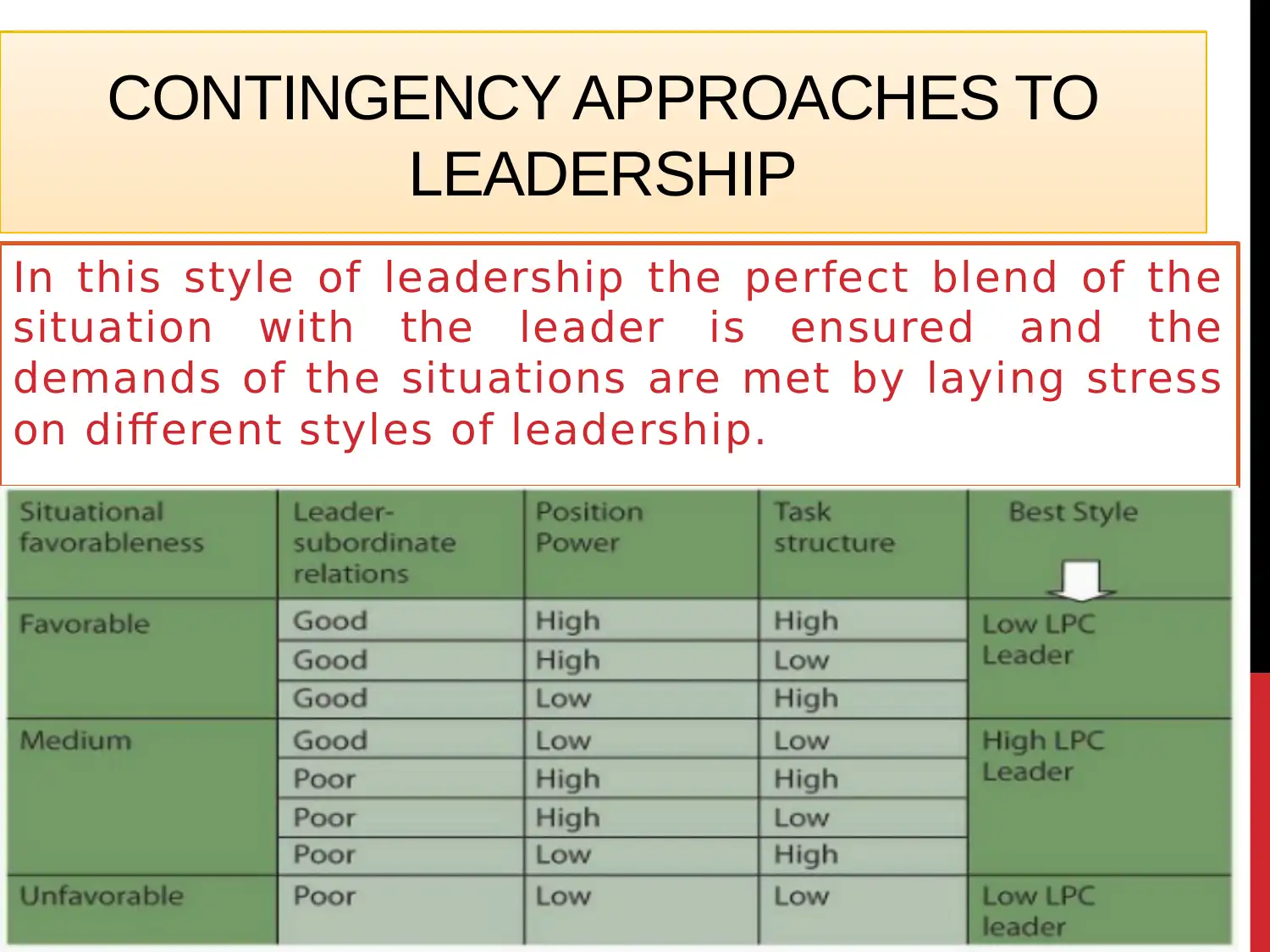
CONTINGENCY APPROACHES TO
LEADERSHIP
In this style of leadership the perfect blend of the
situation with the leader is ensured and the
demands of the situations are met by laying stress
on different styles of leadership.
LEADERSHIP
In this style of leadership the perfect blend of the
situation with the leader is ensured and the
demands of the situations are met by laying stress
on different styles of leadership.
⊘ This is a preview!⊘
Do you want full access?
Subscribe today to unlock all pages.

Trusted by 1+ million students worldwide
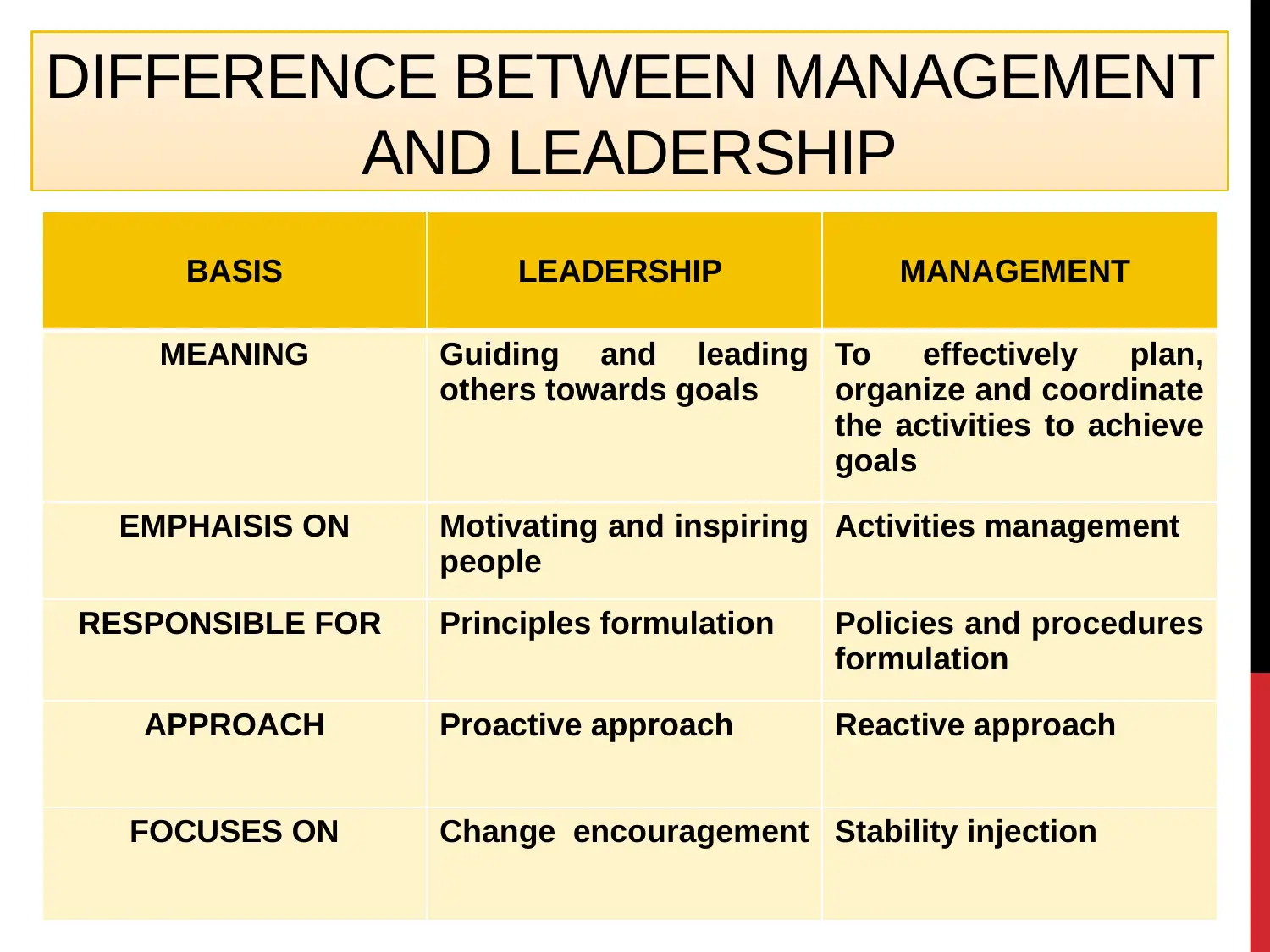
DIFFERENCE BETWEEN MANAGEMENT
AND LEADERSHIP
BASIS LEADERSHIP MANAGEMENT
MEANING Guiding and leading
others towards goals
To effectively plan,
organize and coordinate
the activities to achieve
goals
EMPHAISIS ON Motivating and inspiring
people
Activities management
RESPONSIBLE FOR Principles formulation Policies and procedures
formulation
APPROACH Proactive approach Reactive approach
FOCUSES ON Change encouragement Stability injection
AND LEADERSHIP
BASIS LEADERSHIP MANAGEMENT
MEANING Guiding and leading
others towards goals
To effectively plan,
organize and coordinate
the activities to achieve
goals
EMPHAISIS ON Motivating and inspiring
people
Activities management
RESPONSIBLE FOR Principles formulation Policies and procedures
formulation
APPROACH Proactive approach Reactive approach
FOCUSES ON Change encouragement Stability injection
Paraphrase This Document
Need a fresh take? Get an instant paraphrase of this document with our AI Paraphraser
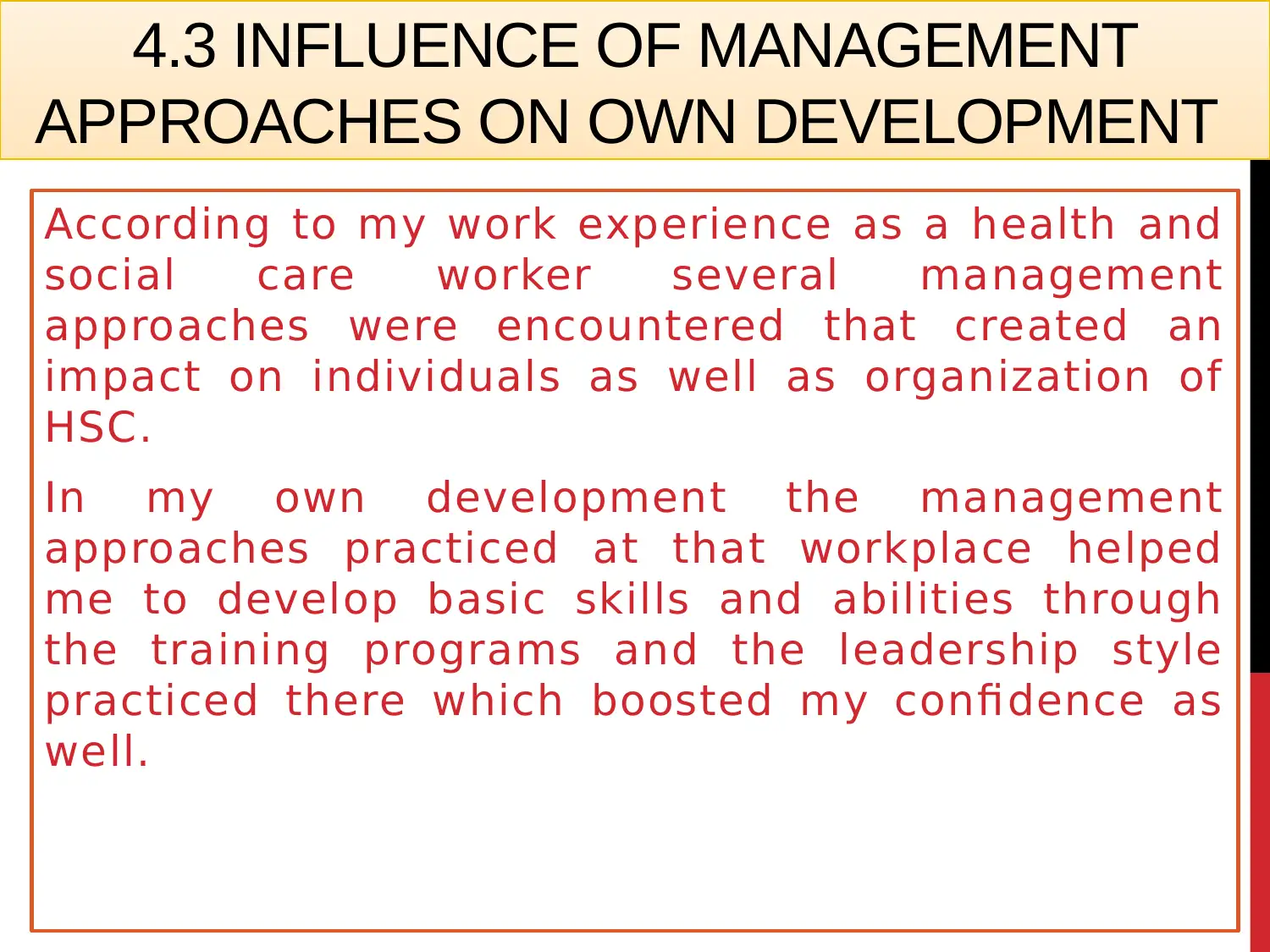
4.3 INFLUENCE OF MANAGEMENT
APPROACHES ON OWN DEVELOPMENT
According to my work experience as a health and
social care worker several management
approaches were encountered that created an
impact on individuals as well as organization of
HSC.
In my own development the management
approaches practiced at that workplace helped
me to develop basic skills and abilities through
the training programs and the leadership style
practiced there which boosted my confidence as
well.
APPROACHES ON OWN DEVELOPMENT
According to my work experience as a health and
social care worker several management
approaches were encountered that created an
impact on individuals as well as organization of
HSC.
In my own development the management
approaches practiced at that workplace helped
me to develop basic skills and abilities through
the training programs and the leadership style
practiced there which boosted my confidence as
well.
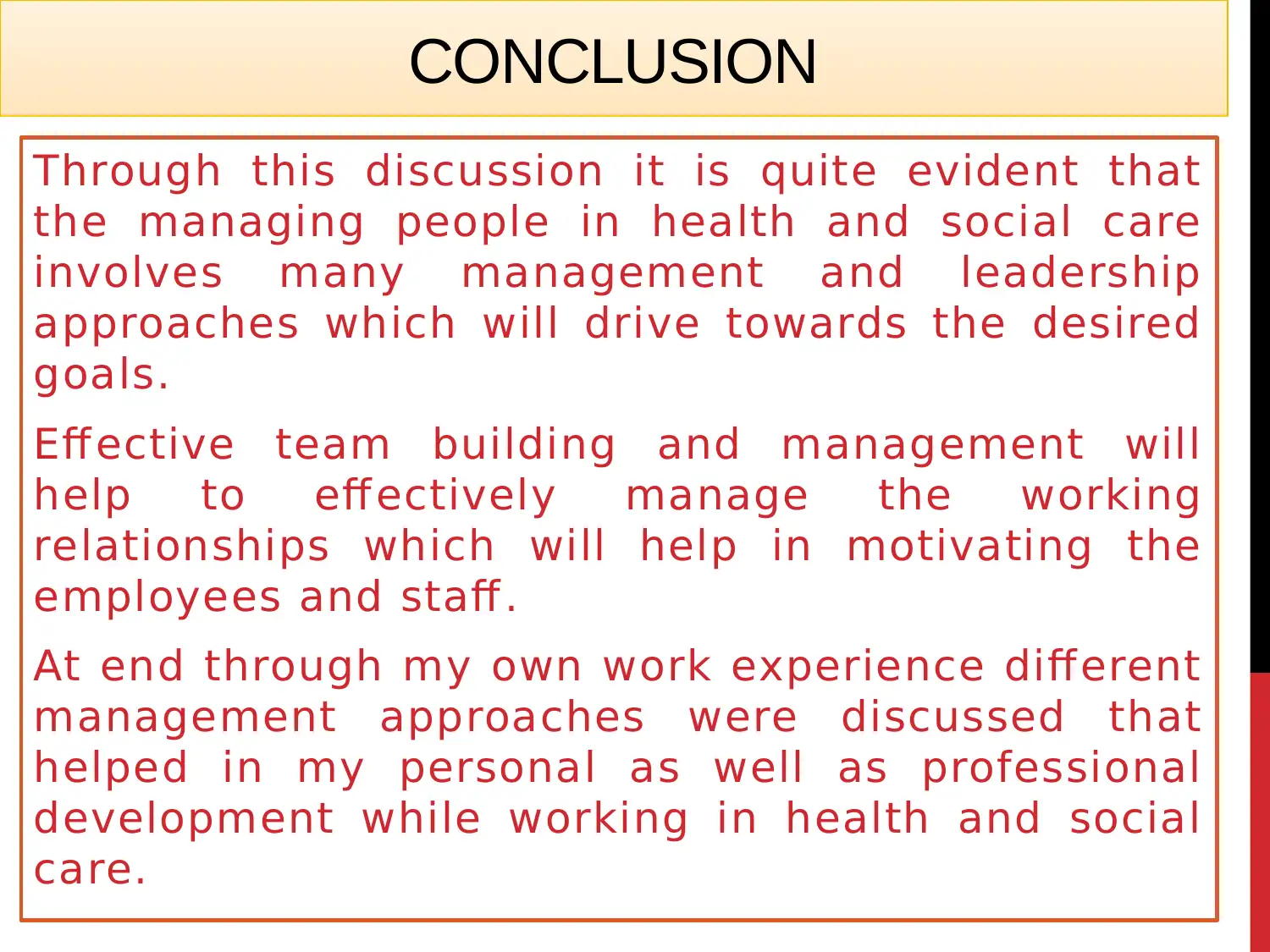
CONCLUSION
Through this discussion it is quite evident that
the managing people in health and social care
involves many management and leadership
approaches which will drive towards the desired
goals.
Effective team building and management will
help to effectively manage the working
relationships which will help in motivating the
employees and staff .
At end through my own work experience different
management approaches were discussed that
helped in my personal as well as professional
development while working in health and social
care.
Through this discussion it is quite evident that
the managing people in health and social care
involves many management and leadership
approaches which will drive towards the desired
goals.
Effective team building and management will
help to effectively manage the working
relationships which will help in motivating the
employees and staff .
At end through my own work experience different
management approaches were discussed that
helped in my personal as well as professional
development while working in health and social
care.
⊘ This is a preview!⊘
Do you want full access?
Subscribe today to unlock all pages.

Trusted by 1+ million students worldwide
1 out of 15
Related Documents
Your All-in-One AI-Powered Toolkit for Academic Success.
+13062052269
info@desklib.com
Available 24*7 on WhatsApp / Email
![[object Object]](/_next/static/media/star-bottom.7253800d.svg)
Unlock your academic potential
Copyright © 2020–2026 A2Z Services. All Rights Reserved. Developed and managed by ZUCOL.





